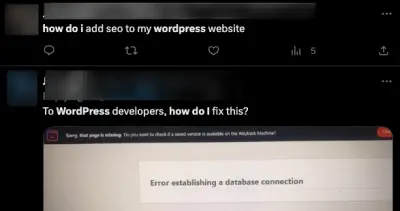Why website marketing is important can differ depending on the type of website and organization we are discussing, but in today’s digital world, website marketing is always important!
As we said in our article 10 Ways to use your website as a marketing tool,
Website marketing is essential if you want your business to succeed. Not being found online is like your business does not exist at all.
For a small business, startup, or solo enterprise, website marketing is even more important because there are likely fewer resources and opportunities to get enough visibility and credibility in other ways.

Get personalized content recommendations and answers drawn from our website. Simply type your question or topic of interest, and our AI assistant will help you find relevant articles, tips, and insights. You can also have a natural conversation to explore topics in more depth.
Importance of website marketing for small business owners
Small business owners need their websites to generate leads, gain new customers, and increase sales in the background while they work on other things. hey spend so much time working on their business they can’t spend as much time promoting their business.
Website marketing is probably the most cost-effective way to get your business in front of your target audience and prospective customers, certainly when you take into account your long-term effectiveness and return on investment.
Imagine having a constant flow of leads coming in via your website without having to hit the phone prospecting. Your website can be like a 24/7 salesperson, diligently attracting and warming up leads primed and ready to close.
Even if you have a local business or physical store only (as opposed to an online business), you still need a website and website marketing. Websites help build trust and allow your customer base to connect more deeply with your brand when you regularly share information such as helpful content or business updates. More importantly, they help get people in the door.
What is Website Marketing?
So what is website marketing?
Website marketing definition: Website marketing is part of your overall marketing strategy focused on promoting your website to increase website traffic and brand awareness to attract more leads and potential customers, and therefore increase sales.
It’s pretty rare in our digital age for a business to not include a professional website in their marketing strategy, but very often the push is around acquiring a new web design while promoting their website is relegated to an afterthought or is outsourced to people who implement tactics on their behalf.
A more effective approach is to define your website marketing strategy and use that to create a strong online presence and measure your online marketing efforts. That means you know exactly what you are trying to achieve, and who you are trying to attract. Once you have defined that you can more effectively brief any freelancers or marketing agency that you hire.
What is a Website Marketing Strategy?
While your digital marketing strategy might include everything from social media marketing to search engine marketing and pay-per-click (PPC) ads, your website marketing strategy is focused entirely on the part of your planning that involves your website.
More specifically, a good website marketing strategy involves:
- Defining your target audience in detail to determine their needs and behaviors.
- Figuring out how you can stand out from your competition and show those people that you can serve them the best.
- Aligning your research discoveries with your products and services, what you offer, and how you fulfill and deliver customer experience.
This will then inform your implementation of that marketing plan with marketing campaigns involving all the marketing channels at your disposal:
- Getting the right people to your website via niche promotion in social media platforms and organic traffic via search engine optimization (SEO)
- Content marketing, user experience, and conversion rate optimization – Giving those people the best information and user experience
- Sales copywriting and landing page design – So they become confident enough to purchase from you.
- E-commerce so your prospects can become customers via self-service.
- Or provide their email address via lead magnets or contact forms so you can contact them in the future for email marketing.
The Importance of a Website Even With Off-Website Digital Marketing
At this point, a person might be thinking of strategies for getting in front of their target audience that do not necessarily involve their own business website. I would argue that website marketing is still important because it will add strength and influence to those strategies while improving your overall customer experience.
Let’s take a look at some examples.
LinkedIn Marketing and Other Social Media Platforms
Some business owners swear by their ability to use their LinkedIn profiles to attract interested prospects. While this can be a useful tactic, imagine if you put all that effort into LinkedIn only for them to penalize your account, curtail your reach, or radically change how their site works.
People think LinkedIn is unlike all the other social media platforms they would never hurt us, but LinkedIn can and will make business decisions that are best for their business, not yours.
Of course, you are already aware that you can swap LinkedIn for your favorite social media platform and the same is just as true.
Far better to create quality content on your own marketing website, share that content on those social media platforms, and bring those prospects back to your home base.
Webinars and Video Streaming
When you create a webinar or video stream you almost always must use a third-party webinar service for the actual delivery, but did you know that you do not have to use their third-party sign-up forms or even email follow-up sequences?
How much better would your prospects’ user experience and your brand awareness be if those sign-up web pages and those follow-up emails had your domain name and branding attached rather than the service you are paying to host the video stream?
Again it is about getting people to your website, interacting with your website, and getting the most high-quality possible experience from your website.
Not only will you have more control over your website design, and therefore your visitor’s first impression, but you will also be able to tell from your Google Analytics and other metrics what you should or can improve in the future.
Hijacking Other Website’s Google Authority (AKA Parasitic SEO)
There are some markets that are so difficult to compete in that website owners and SEO agencies are resorting to paying other websites to allow them to write and publish articles under their third-party domain.
While this is currently a tactic that does work in Google Search, how long will it be before the spam team at Google nukes these websites from their search engine results pages (SERPs)? Any spammy SEO tactic that gets overused has a short shelf life.
Google prefers websites that have built up trust and topicality in your subject area or market. By spending money and putting in the effort to create hopefully high-quality content on a site that you do not own, you are banking on that off-topic website providing enough sales before it goes away. Not only that, but how persuasive is that third-party website to your demographic, and how distracting is their website layout?
Is it worth spending thousands of dollars for a pay-to-play guest article rather than building up the trust, authority, and brand awareness of your own business? If I am going to write for another website you can be sure I will insist on a clean link back to my website, and the site I write for will have an already established brand with one of my sought-after prospect cohorts.
Website Marketing and the Importance of Social Media
Earlier we looked at the problem of choosing social media over website marketing, and how you can come unstuck. Using social media with website marketing, however, can still be a powerful approach.
The key is to use social media to engage with your audience, prospects, and community, and to expand your reach. Our goal, as always, is to bring people back to our website with links to articles and via our social media profiles.
Another amazingly valuable part of social media that not everyone realizes is listening.
While reach and link clicks have been curtailed by algorithms seemingly prioritizing paid exposure via their advertising systems, discussions are still a richly valuable part of social media life.

People ask questions, they complain, and we reach out for advice and suggestions. If you take care to observe and make a note of trends, this can fuel your content creation and even product ideas.
Website Marketing and SEO
SEO and Website Marketing go together in two different but equally important ways:
SEO for Third-Party Websites
Without a website to promote, your SEO efforts will not go very far.
Yes, you can get search engine traffic to a website that is not your own, and you can work to build that up, but you will always be creating an asset that does not belong to you.
There are a lot of SEO agencies that would love to do a “rent and rank” deal with you, but once the contract is over you are left without your sales lead generator, and you will need to start over with your search engine rankings!
Instead, it is far more lucrative long term to have your own asset that is worked on and built up. That means using SEO for website marketing.
Promoting Your Website for SEO
The other aspect of SEO with website marketing is for your search engine optimization efforts to really pay off, you need to be promoting your website.
Now people might wonder how promoting your website and SEO are different. Let me explain.
There are SEO elements that happen on your website. These are commonly referred to as on-page or on-site SEO. Things like the keywords you use and where you use them, plus how you interlink your pages and articles on your website.
Then there are off-site aspects, such as link building. While some content can naturally attract links as people find and enjoy your content, you can not rely on that to happen, especially in highly competitive markets.
Actively promoting your website, in particular specific pages and articles on your website, as well as generating direct referral traffic, will help you attract more and better links, and that in turn will help you rank in search results.
Do You See Why Website Marketing is Important?
By now I have made my case for why website marketing is important to business success, and I want to hear from you what you think. Sooner or later you will need to get your website marketing up to scratch, so start now.
Are you going to promote your website? Will you mine social media for content and product ideas? How are you going to encourage strong and on-topic links to your articles for your SEO?
If you would like our help with any of this, you know you can reach out to David for a chat!







